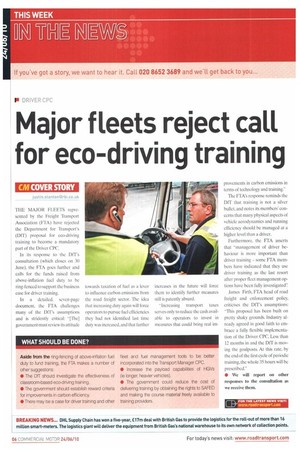Major fleets reject call for eco-driving training
Page 6

If you've noticed an error in this article please click here to report it so we can fix it.
CM COVER STORY justin.stantonfarhi.ca.uk THE MAJOR FLEETS represented by the Freight Transport Association (FTA) have rejected the Department for Transport's (DfT) proposal for eco-driving training to become a mandatory part of the Driver CPC.
In its response to the DfT's consultation (which closes on 30 June), the FTA goes further and calls for the funds raised from above-inflation fuel duty to be ring-fenced to support the business case for driver training.
In a detailed, seven-page document, the ETA challenges many of the Dff's assumptions and is stridently critical: "IThe I government must review its attitude towards taxation of fuel as a lever to influence carbon emissions from the road freight sector. The idea that increasing duty again will force operators to pursue fuel efficiencies they had not identified last time duty was increased, and that further increases in the future will force them to identify further measures still is patently absurd.
-Increasing transport taxes serves only to reduce the cash available to operators to invest in measures that could bring real im provements in carbon emissions in terms of technology and training."
The ETA's response reminds the DfT that training is not a silver bullet, and notes its members' concerns that many physical aspects of vehicle aerodynamics and running efficiency should be managed at a higher level than a driver.
Furthermore, the FTA asserts that "management of driver behaviour is more important than driver training — some FTA members have indicated that they use driver training as the last resort after proper fleet management options have been fully investigated': James Firth, FTA head of road freight and enforcement policy, criticises the DiT's assumptions: "This proposal has been built on pretty shaky grounds. Industry already agreed in good faith to embrace a fully flexible implementation of the Driver CPC. Less than 12 months in and the DfT is moving the goalposts. At this rate, by the end of the first cycle of periodic training, the whole 35 hours will be prescribed."
• We will report on other responses to the consultation as we receive them.












































































































































